Julius Adolphe Schweinfurth | |
|---|---|
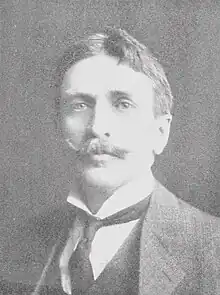 | |
| Born | September 20, 1858 |
| Died | September 29, 1931 (aged 73) |
| Occupation | Architect |
| Spouse |
Fannie Bellows (m. 1889) |
| Children | Charles Schweinfurth |
| Buildings | |
| Burial place | Walnut Hills Cemetery |
| Relatives |
|
Julius Adolphe Schweinfurth (September 20, 1858 – September 29, 1931) was an American architect, artist, and designer.
Biography
Julius Adolphe Schweinfurth was born September 20, 1858, in Auburn, New York to German immigrants Charles J. Schweinfurth and Katherine Ammon. His brothers A. C. Schweinfurth and Charles F. Schweinfurth were also architects and his grandfather was Georg August Schweinfurth was a botanist and African explorer.[1] Schweinfurth's father was an engineer and studied at the Stuttgart Polytechnic Institute before immigrating to America in the 1850s.[2]
Schweinfurth attended Auburn Academic High School and graduated in 1876. Afterwards, Schweinfurth moved to Boston, Massachusetts in 1879 and worked for the architectural firm of Peabody and Stearns.[2]
In 1883, Schweinfurth partnered with his brother Charles in Cleveland, Ohio. The two remained partners until 1885 when Schweinfurth left to tour Europe for nine months. He studied in England, Spain, Italy, and France in addition to museums such as the South Kingston Museum in London.[3] Upon his return to the United States in 1886, Schweinfurth rejoined Peabody and Stearns as chief designer.[2] A year later, he published a collection of his work from Europe titled Sketches Abroad.[4]
In 1895, Schweinfurth left Peabody and Stearns to start his own practice. His private practice lasted 33 years until he retired in 1928. He designed over 70 buildings during this period.[2] He also entered numerous design competitions such as for the American Fine Arts Society (1891),[5] the Minnesota Statehouse (1895), and the Boston Athenæum (1902).[3]
In addition to his architectural work, Schweinfurth was a skilled graphic designer, drawer, and watercolorist. He designed a cover for Francis Parkman's The Oregon Trail.[6]
In 1925, Schweinfurth was elected Fellow of the American Institute of Architects.[7] He was also active in the Boston Society of Architects.
Family and death
In 1889, Schweinfurth married Fannie Bellows of Boston. In 1890, Charles Schweinfurth, their son and only child, was born. Schweinfurth died September 29, 1931, at his home in Wellesley, Massachusetts. He was buried at Walnut Hills Cemetery in Brookline, Massachusetts.[1][8]
Schweinfurth founded the Schweinfurth Art Center in Auburn, New York. Northeastern University now holds the primary collection of Schweinfurth's work.[3]
Selected works
- Bradley Mortuary Chapel at Fort Hill Cemetery (1893), Auburn, New York
- Mary Hutcheson Page residence (1893), 21 Hawthorn Rd., Brookline, Massachusetts
- Saint Paul's Church Parish House (1895), Brookline, Massachusetts
- Champaign Public Library (1896), Champaign, Illinois
- John Hancock memorial marker in Old Granary Burying Ground (1896), Boston, Massachusetts[9]
- Christ Chapel at George Junior Republic (1900), Freeville, New York — Now on the campus of William George Agency
- Pierce Grammar School (1901), 32 Pierce St., Brookline, Massachusetts
- Police Station and Municipal Court Building (c. 1901), Brookline, Massachusetts[10]
- Wellesley College residential dormitory quadrangle (1903), Wellesley, Massachusetts[3]
- Beebe Hall (1908), Cazenove Hall (1905), Pomeroy Hall (1904), Shafer Hall (1909), Wilder Hall (1899)
- Sarah J. Baker School (1905), Boston, Massachusetts
- Baptist Church (1908), Brookline, Massachusetts
- Ridgewood Cemetery entrance gate (1909), North Andover, Massachusetts
- Tod Homestead Cemetery Gate (1909), Belmont Ave., Youngstown, Ohio — Listed on the NRHP
- High School of Practical Arts (1912), Greenville St., Roxbury, Massachusetts — Was home of Girls' High School from 1954 to 1974
- Quincy E. Dickerman School (1915), 206 Magnolia St., Dorchester, Massachusetts
- Thomas Gardner School (1915), 30 Athol St., Allston, Massachusetts — Now the Gardner Pilot Academy
Gallery
Architectural works
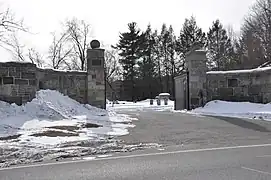 Entrance gate to Ridgewood Cemetery, North Andover, Massachusetts
Entrance gate to Ridgewood Cemetery, North Andover, Massachusetts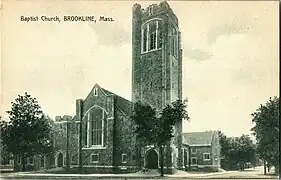 Baptist Church, Brookline, Massachusetts
Baptist Church, Brookline, Massachusetts Pierce Grammar School, Brookline, Massachusetts
Pierce Grammar School, Brookline, Massachusetts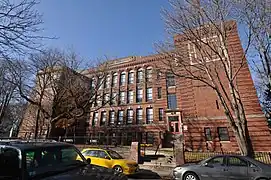
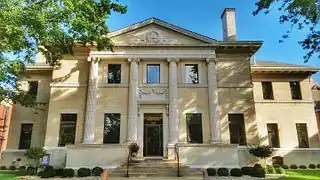
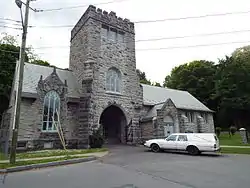 Bradley Mortuary Chapel at Fort Hill Cemetery, Auburn, New York
Bradley Mortuary Chapel at Fort Hill Cemetery, Auburn, New York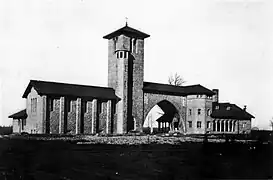 Tod Homestead Cemetery Gate, Youngstown, Ohio
Tod Homestead Cemetery Gate, Youngstown, Ohio Hemenway Hall Gymnasium, Wellesley College
Hemenway Hall Gymnasium, Wellesley College High School of Practical Arts, Roxbury, Massachusetts
High School of Practical Arts, Roxbury, Massachusetts Quincy E. Dickerman School, Dorchester, Massachusetts
Quincy E. Dickerman School, Dorchester, Massachusetts Police Station and Municipal Court Building, Brookline, Massachusetts
Police Station and Municipal Court Building, Brookline, Massachusetts Competition design for the Minnesota State Capitol
Competition design for the Minnesota State Capitol Wilder Hall, Wellesley College
Wilder Hall, Wellesley College
Design works
 John Hancock memorial, Boston
John Hancock memorial, Boston Cover for Francis Parkman's The Oregon Trail
Cover for Francis Parkman's The Oregon Trail Fireplace design in The Brickbuilder
Fireplace design in The Brickbuilder Fireplace design in The Brickbuilder
Fireplace design in The Brickbuilder 1889 illustration
1889 illustration
References
- 1 2 "Julius A. Schweinfurth, Boston Architect, Dies". The Boston Globe. September 29, 1931. p. 19.
- 1 2 3 4 "Julius A. Schweinfurth". Schweinfurth Art Center. Spring 2021. Archived from the original on November 26, 2022. Retrieved May 28, 2023.
- 1 2 3 4 O'Gorman, James F. (1989). On the Boards: Drawings by Nineteenth–Century Boston Architects. Philadelphia: University of Pennsylvania Press. pp. 132–135. ISBN 0-8122-8170-5.
- ↑ Schweinfurth, Julius A. (1888). Sketches Abroad. Boston: Ticknor and Co. hdl:2027/gri.ark:/13960/t0kt3k593 – via HathiTrust.
- ↑ "Index to Illustrations". The Engineering Magazine. New York: The Engineering Magazine Co. X: 511. 1896 – via Internet Archive.
- ↑ White, Gleeson, ed. (1896). Bookbindings, Old and New. London: George Bell & Sons. p. 229.
- ↑ "Election of Fellows". The American Architect. The Architectural & Building Press, Inc. CXXVII (2471): 405. May 6, 1925 – via Internet Archive.
- ↑ "Funeral Tomorrow of Julius A. Schweinfurth". The Boston Globe. September 30, 1931. p. 8.
- ↑ "HONORS FOR JOHN HANCOCK.; Unveiling of a Memorial Shaft Above the Patriot's Tomb". The New York Times. September 11, 1896. p. 5.
- ↑ A History of Brookline, Massachusetts. Brookline, Massachusetts: The Brookline Press Company. 1906. pp. 193–194.